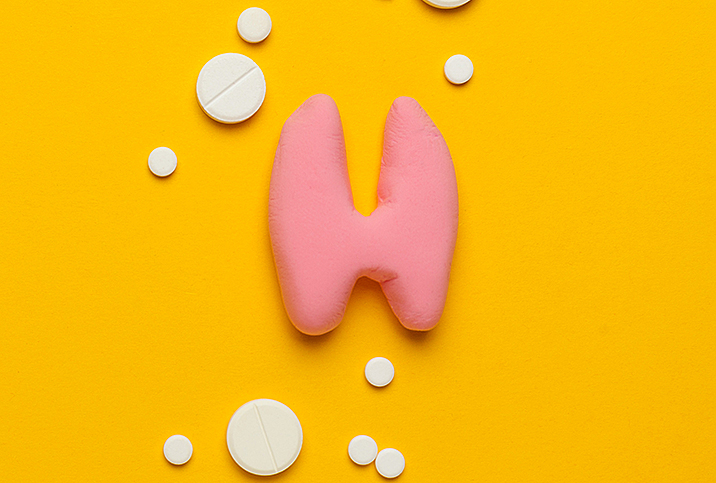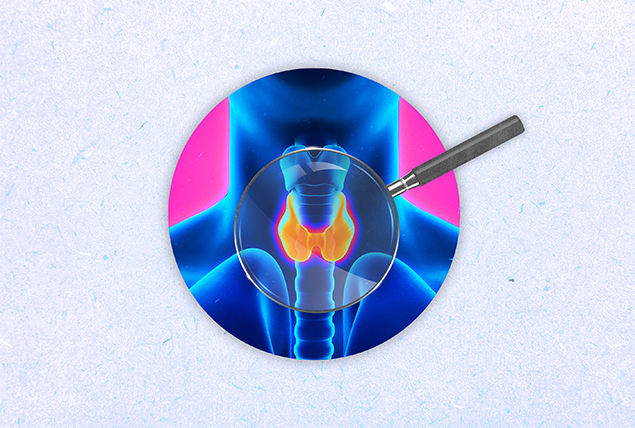Making the Most of Your Life When You Have Hypothyroidism

Hypothyroidism, or when the thyroid gland insufficiently produces T-3 and T-4 hormones, is a common health condition. A lack of balanced thyroid hormone (TH) levels can cause dire consequences for metabolism, growth, development and reproduction.
If you have hypothyroidism, you aren't alone.
Can I have a normal life with hypothyroidism?
The endocrine system creates and circulates hormones throughout the body via specialized glands. The thyroid gland, a part of your endocrine system, looks like a pair of butterfly wings positioned at the base of the neck, creating and circulating hormones.
These hormones—triiodothyronine (T-3) and thyroxine (T-4)—help fuel other cells.
Roughly 5 out of 100 Americans ages 12 and older have hypothyroidism, although most experience only mild symptoms, according to the National Institute of Health (NIH).
Hypothyroidism is most common in women, but it can affect men, too. Some well known people with hypothyroidism in the United States include the following:
- Bernie Sanders
- Gigi Hadid
- Hilary Clinton
- Jameela Jamil
- Kelly Clarkson
- Kim Cattrall
- Linda Ronstadt
- Missy Elliott
- Oprah Winfrey
- Rod Stewart
- Sofia Vergara
- Tarek El Moussa
- Wendy Williams
How do you live and date with hypothyroidism?
"There are a number of lifestyle and nutritional approaches that can be used either in conjunction or stand-alone to support hypothyroidism," said Alyce Garth, a thyroid and autoimmune health and nutrition coach in Queensland, Australia.
As someone with hypothyroidism, Garth has the following helpful recommendations:
- Balance stress and cortisol levels
- Follow an anti-inflammatory diet and avoid eating refined and processed foods
- Increase iodine intake (if caused by iodine deficiency).
- Move your body regularly
- Reduce environmental toxin exposure
- Support your blood sugar levels and your adrenal glands
When someone has an underactive thyroid, they may notice a decrease in mood.
"Sufferers often experience depression, lethargy, fatigue and overall disinterest. These symptoms can negatively affect personal relationships and the strain can make dating more difficult," said dual board-certified dermatologist Alpana Mohta, M.D., DNB, based in Rajasthan, India.
"Relationships can be negatively impacted due to the individual needing more sleep, having less resilience to life's challenges and generally just not being their happy self and doing the activities that light them up," Garth said.
Hypothyroidism can affect other areas of your health—including your sexual health.
How can hypothyroidism affect your sex life?
"Both underactive and overactive thyroid can decrease sexual function," said Sarah Tedjasukmana, MBBS, DCH, CBS, FRACGP, a specialist general practitioner in New South Wales, Australia.
"Patients, especially women, may complain of lower libido—encompassing both desire and arousal—or of vaginal dryness." Tedjasukmana said.
Hypothyroid-related sexual dysfunctions for women are elevated during times of hormonal fluctuations, such as during their period or perimenopause.
Yes, hypothyroidism can affect your libido, too. Some women may experience anorgasmia, or an absent, delayed, less intense or infrequent orgasm following adequate sexual arousal and stimulation.
Furthermore, changes in physical appearance—such as swelling and weight gain—can lower self-esteem and sex drive.
"On a base level, individuals may just simply lack the energy needed for sexual contact," Garth said. "If hypothyroidism is causing sexual dysfunction, practice self-compassion and facilitate open communication with your partner."
Can men have hypothyroidism?
Men are no strangers to the pitfalls of hypothyroidism, either. Hypothyroidism can cause erectile dysfunction (ED).
"Erectile dysfunction is common," Mohta said, "and many patients have reported instances of delayed ejaculation."
Lower levels of testosterone contribute to the whopping 63 percent of men with hypothyroidism who concurrently have some degree of sexual dysfunction, suggested a 2019 report.
Relatedly, underactive thyroids have been linked to ineffectual spermatogenesis and fertility.
Treatment for hypothyroidism has helped the majority of men experiencing problems with their sexual health find symptom relief, indicated a 2018 report. The results for women are mixed.
Can you get pregnant if you have hypothyroidism?
Libido, lubrication and orgasmic reduction aside, some women may have problems with conception, too.
"If regular menstruation was being affected by the condition, it may lead to fertility issues, making it hard to become pregnant," Tedjasukmana said.
"Furthermore, gestation has a huge impact on thyroid function because the gland needs to significantly increase TH production to support both the mother and fetus in the early stages."
Hypothyroidism can affect fertility. It can also lead to poor health outcomes for the mother and child. These health conditions include:
- Gestational diabetes
- Hypertension
- Postpartum hemorrhage
- Placental abruption
- Stillbirth
- Prematurity
- Low birth weight
Severe or untreated maternal hypothyroidism can cause impaired neurocognitive development and high risks of learning disabilities or low IQs.
Anyone with a history of hypothyroidism should have their TH levels tested throughout their pregnancy.
What happens if you don't treat your hypothyroidism?
Several associated complications may result if an underactive thyroid remains untreated. These health conditions include:
- Enlarged thyroid glands, or goiters, that may cause breathing and swallowing obstructions.
- Peripheral neuropathy from prolonged untreated hypothyroidism, impairing peripheral nerves' ability to relay messages from the brain and spinal cord to other areas of the body and leading to numbness, tingling and pain in the extremities.
Other causes of concern are high cholesterol and heart disease. Because sufferers of hypothyroidism often produce an abundance of low-density lipoprotein (LDL) cholesterol, they are at an elevated risk for coronary artery disease (CAD) and heart failure.
Though rare, myxedema coma is potentially fatal. This extreme hypothyroidism requires immediate treatment.
How can you prevent hypothyroidism if it runs in your family?
There are no direct preventative measures against hypothyroidism, but there are some ways to reduce the risk of hypothyroidism.
"Cigarettes, excessive soy consumption and uncontrolled celiac disease interfere with TH production and absorption, so they should be avoided," Tedjasukmana said. "Be wary of iodine content in food, as both a lack and excess of iodine can cause hypothyroidism."
Thyroid neck checks can find goiters. A thyroid collar during x-rays can help reduce the risk of thyroid cancer. Patients treated for thyroid cancer with radioiodine therapy may develop hypothyroidism, so stay on top of your wellness checks.
How do you treat hypothyroidism?
Stabilizing TH levels is important. Designate a time and storage space for your medication, such as levothyroxine. This medication works best on an empty stomach.
Never stop or reduce the dosage without a doctor's approval, even in the absence of symptoms.
What are helpful resources for people with hypothyroidism?
Anyone affected by underactive thyroids can turn to the American Thyroid Association (ATA) for support, education and advocacy.
Garth endorsed her regional counterpart, the Australian Thyroid Foundation (ATF).
"The take-home message in my mind is that hypothyroidism is so very easily diagnosed and so very easily treated," Tedjasukmana said.
The American Association of Clinical Endocrinology (AACE) has a wealth of information regarding clinical practice guidelines, presentations, articles and recent developments in research.
Another good source is Thyroid Federation International (TFI), which offers webinars, events, member benefits, doctor databases and newsletters for patients and caregivers around the globe.


















